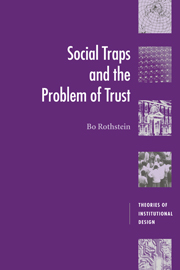Book contents
- Frontmatter
- Contents
- List of tables and figures
- Acknowledgements
- 1 Reflections after a long day in Moscow
- 2 On the rational choice of culture
- 3 On the theory and practice of social capital
- 4 Social capital in the social democratic welfare state
- 5 How is social capital produced?
- 6 The problem of institutional credibility
- 7 Trust and collective memories
- 8 The transition from mistrust to trust
- 9 The conditions of trust and the capacity for dialog
- Bibliography
- Index
2 - On the rational choice of culture
Published online by Cambridge University Press: 22 September 2009
- Frontmatter
- Contents
- List of tables and figures
- Acknowledgements
- 1 Reflections after a long day in Moscow
- 2 On the rational choice of culture
- 3 On the theory and practice of social capital
- 4 Social capital in the social democratic welfare state
- 5 How is social capital produced?
- 6 The problem of institutional credibility
- 7 Trust and collective memories
- 8 The transition from mistrust to trust
- 9 The conditions of trust and the capacity for dialog
- Bibliography
- Index
Summary
Culture, rationality, and social traps
Should the variation in the problem of social traps be understood by reference to inherited cultural traits or by reference to individual rationality? Do people engage in corrupt practices and become cynical and mistrusting towards their fellow citizens through established and taken-for-granted cultural norms, or should this be seen as a rational response to dysfunctional institutions and untrustworthiness? This problem is directly linked to one of the most intense debates in political science which concerns the value of theories based on cultural systems versus the approach labeled “rational choice.” According to one important textbook, they stand “as the principal competing theoretical schools” in the discipline (Dowding and King 1995; Lichbach and Zuckerman 1998: 5, cf. Elster 2000a). While proponents of the rational choice approach may often agree that culture is important for understanding how agents get their preferences, they add that explanations based on culture “resist systematic analysis” (Johnson 1997: 6). Advocates of the culturalist approach often similarly agree that the control over symbols, rituals and identity may be “bitterly contested” in a strategic game of power (Ross 1998: 45). But they also state that “rational choice scholars are often drawn to models of individual behavior that are not only very wrong, but known to be very wrong, as depictions of what political subjects actually do, think, and feel” (Lustick 1997: 12).
- Type
- Chapter
- Information
- Social Traps and the Problem of Trust , pp. 28 - 42Publisher: Cambridge University PressPrint publication year: 2005

